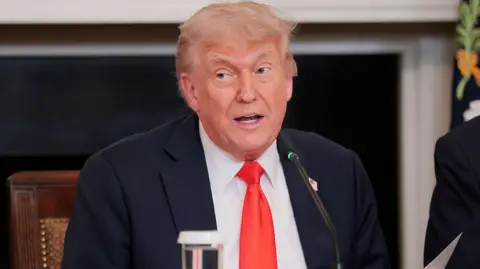Trump pushes to move hush-money appeal to federal court
 Getty Images
Getty ImagesAttorneys for Donald Trump argued on Wednesday that the appeal over his felony conviction in New York should be moved to federal court because the case related to official acts as president, while the state said it was too late to make the change.
Trump was convicted last May of lying in relation to a hush-money payment to adult-film star Stormy Daniels, which he appealed.
Then, in July, the US Supreme Court granted the president immunity for official acts. For Trump's legal team, the goal of moving to federal court is for the conviction to be overturned on immunity grounds.
Both sides made their case during a one-hour hearing before a three-judge panel of the 2nd US Circuit Court of Appeals.
Trump's attorney, Jeffrey Wall, argued that the president's appeal belonged in federal court because the Manhattan District Attorney's Office chose to include evidence that they say relates to Trump's official acts as president, including testimony from former White House Communications Director Hope Hicks.
"Everything about this cries out for federal court," Mr Wall told the three-judge panel.
The Manhattan District Attorney's Office, meanwhile, argued Trump's legal team took too long to ask for the case to be moved, after his sentencing.
"After sentencing, removal is no longer available," said Steven Wu of the Manhattan District Attorney's Office. "Even if it were technically available, there are compelling reasons not to permit it."
Mr Wu also disagreed with Trump's attorneys that some of the evidence presented in the hush-money trial related to his official acts. He gave an example of a postal worker who robbed someone while not at work, but then chose to confess his crimes in the postal office.
The confession in the office, he argued, would not be related to the postal worker's official duties.
Trump's crime, Mr Wu argued, "was completed before the White House evidence".
During the hearing, the three judges pressed both sides, noting the case was "extraordinary" and "highly unusual".
One judge told Mr Wall it would be "quite anomalous" for an appeal to be moved to federal court.
But another noted that the Supreme Court in their immunity ruling used "broad" language to describe which evidence related to "official acts" as president.
The panel is expected to issue a written opinion at a later date.
Trump's attorneys argued last September for his New York case to be moved to the federal courts, but that request was denied by US District Judge Alvin Hellerstein. The 2nd US Circuit court is now hearing the appeal of that decision.
Trump was sentenced in the hush-money case 10 days before taking office in January. He was given an unconditional discharge, meaning he received no fines, probation or jail time, but the conviction will stay on his record.
Trump was indicted in several criminal state and federal cases before his latest run for office, but the New York case was the only one to go to trial before he won the presidency.
Trump's defence lawyers in the New York case, including Todd Blanche and Emil Bove, have since been promoted to positions in the Justice Department.
